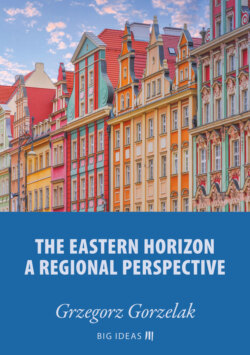Читать книгу The eastern horizon – A regional perspective - Grzegorz Gorzelak - Страница 7
На сайте Литреса книга снята с продажи.
ОглавлениеTHE EASTERN HORIZON
The trajectories of the countries and regions of Central and Eastern Europe (CEE) during the last hundred years do prove that almost everything is possible. In this relatively short period these countries have regained independence, have suffered during World War Two, have gone through totalitarian and authoritarian communist regimes and lastly they have rejoined Europe, moving from the second to the “first periphery” of the developed world. Although at the start of their EU membership the “end of history” may have appeared as a plausible way to look to the future of CEE, recently unexpected phenomena have questioned these hopes and placed several new challenges before the new Member States.
“ After the initial period of institutional convergence, a few years ago a stream of right-wing populism movements emerged and spread in most of the CEE countries, and the European values of deliberative democracy and the rule of law have come to be replaced by growing centralisation.
Two of these challenges seem the most important: the political and the economic. After the initial period of institutional convergence, a few years ago a stream of right-wing populism movements emerged and spread in most of the CEE countries, and the European values of deliberative democracy and the rule of law have come to be replaced by growing centralisation, breaking constitutional orders and even introducing some manifestations of authoritarian rule. The migration crisis of 2015-2016 aggravated these processes, since all CEE countries disagreed with the EU’s stance on this issue. Thus, at this moment, the rationale of Eastern enlargement, although not yet questioned openly, has become a less obvious geopolitical decision than it appeared a decade ago.
MARCH 2020, THE 55TH KARLOVY VARY INTERNATIONAL FILM FESTIVAL, ONE OF THE OLDEST FILM FESTIVALS IN THE WORLD, WAS CANCELLED DUE TO THE CORONAVIRUS PANDEMIC.
The most recent coronavirus pandemic has posed additional economic challenges. It has to be remembered that the economic success of CEE was, to a great extent, the result of the incorporation of these countries into global value chains and the relocation of many industries from the West to the East of Europe. Foreign direct investment (FDI) was the main channel for innovation and technology transfers to the CEE countries. Global recession caused by the pandemic has seriously jeopardised the supply networks on which the economies of the CEE countries strongly depend. The broad tourist sector has become another field in which the CEE economies have suffered because of the pandemic.
These two challenges have a clear regional manifestation. The political changes clearly negatively affect local and regional governments, which in some CEE countries have already acquired a strong position in the institutional order of public management. The economic crisis may affect the metropolitan cores of the CEE countries, which since the post-socialist transition have become the main engines of transformation, attracting FDI into the modern value and knowledge-intensive services. The switch to teleworking and telecommuting may negatively influence metropolitan employment in CEE and leave many new offices idle, as well as hotels, apartments and tourist services in the largest cities of CEE. By the same token, weakening of industrial networks may jeopardise the development of several industrial regions in CEE which have gone through successful industrial restructuring, to a large extent due to the involvement of Western European capital (now under protectionist pressure of several EU governments).
Should one be pessimistic? Probably not, since the CEE countries have proved – over the last century – that they are able to overcome even the most severe difficulties, and nowadays they may enjoy encouragement, shelter and assistance from the European Union, so widely appreciated by the societies of CEE, even if some political elites of these countries may sound Eurosceptic (but not when financial transfers are involved).
